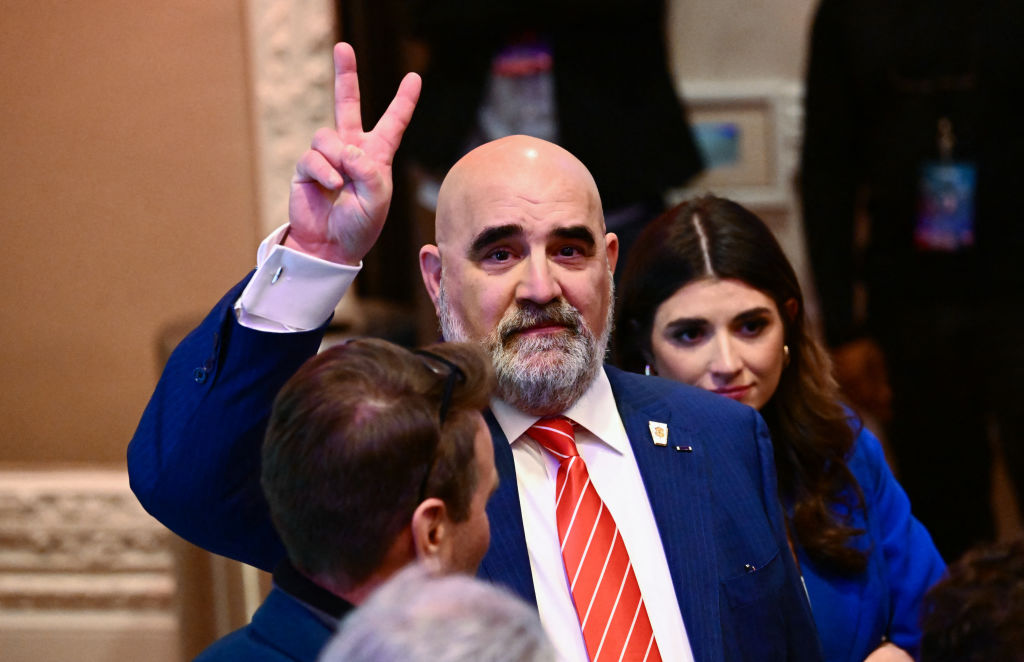MILWAUKEE— Chris LaCivita looks happy. Content. Even relaxed.
“We have nearly 20 paths to get to what we need to get,” LaCivita, a senior adviser to Donald Trump’s presidential campaign, said Tuesday afternoon. “And they have one, maybe two.”
The 58-year-old political consultant and Marine combat veteran has a reputation for being hard-nosed, data-driven, and no-nonsense. A barrel-chested bald man with a salt-and-pepper beard and bushy eyebrows that move expressively over his frameless glasses, he looks all the part of what his friend, Democratic consultant Mo Elleithee, called him at the same event: “the prince of the dark arts” of politics.
But at the Tuesday event sponsored by the Georgetown Institute of Politics and held a few blocks from the Republican National Convention, the typically gruff LaCivita sounded practically sunny about the prospects for his boss, Trump, and the Republican Party. He boasted that the campaign is “on offense” in the three must-win states for Joe Biden—Wisconsin, Michigan, and Pennsylvania. He was giddy relaying the details of polls that showed Trump competitive in states the GOP has not won in several years, including Virginia, Minnesota, New Mexico, and New Jersey. (“New Jersey! What?”) He practically rubbed his hands together in glee at the fact that Democrats are still at war with each other over whether to replace Biden with another, younger candidate.
“I mean, my God, they’re trying to fight off a coup right now,” LaCivita said as he spoke with Elleithee and Lanhee Chen, a Republican policy consultant.
Perhaps the upbeat mood among Republicans here in Milwaukee is rubbing off on LaCivita. Along with all of the good poll numbers for Trump, the recent breaks for the former president in his legal travails, and the disarray among Democrats, there’s an infectious sense in and around the Fiserv Forum that everything is going the GOP’s way. Even Saturday’s assassination attempt on Trump has contributed to the good vibes; the Republican nominee’s dramatic arrival Monday night in the convention hall provided confirmation of the miracle of his survival to the arena of cheering delegates.
It all looks like the convention of a winner and for Trump, appearance is everything. Appropriately, LaCivita frames the race in those terms, arguing Trump’s edge over Biden comes primarily from what differences voters see in both candidates and their respective presidencies.
“We talk a lot about strength versus weakness, success versus failure, and then the dishonesty of the Biden administration,” he said. “And you know, those are very visual words, right? And so politics is—modern-day politics is very visual. And so anytime you can actually visualize the issues and the contrasts, you know, you kind of, you start off with a different advantage.”
Democrats, meanwhile, have been forced to run what LaCivita considers a “base election” that relies on spending “tens of millions of dollars” on ads to turn out traditional Democratic voters by talking up Trump’s threat to democracy. What that reveals, LaCivita argued, is a “huge problem” Biden has in getting turnout from the Democratic base on the most important issues such as inflation, economic outlook, and border security. That problem, he added, is compounded by the marginally significant inroads Trump and Republicans are making with minority groups.
And according to LaCivita, none of that changes if Democrats somehow succeed in replacing Biden with a younger nominee. Be it Kamala Harris or anyone else, he said he is confident the Republicans’ message won’t need to shift.
“There won't be a huge change in terms of the messaging, in terms of the positioning,” LaCivita said. “I firmly believe that if something like that happened, that the national press corps would do their best to grant Kamala a reset button. But we won’t allow that because there is the ticket. It’s where they are, so the issue sets don’t change. The names may change. But the issues don’t.”
And Trump’s selection of Sen. J.D. Vance as his running mate is only a doubling down on what LaCivita thinks makes Trump a strong candidate: someone who can further grow a populist, working-class coalition that Trump has cobbled together since 2016. A longtime GOP consultant who has worked for candidates across the spectrum of the party, LaCivita emphasized how the new ticket is “redefining the Republican Party.” Vance helps underscore this new definition, he said, a person to “plug in” anywhere to bring more voters into Trump’s tent.
“But make no mistake,” LaCivita added, perhaps sensing the conversation had spent a little too much time on the new guy on the ticket. “You know, Donald Trump is the person who’s driving this. You know, people aren’t voting for a vice president, right? They’re voting for a president.”
Conventions can often leave party faithful with a false, temporary high. A gathering of like-minded, motivated superfans listening to speech after rah-rah speech find it hard to believe anyone might vote for the other guy. The post-convention reality reveals that parties and campaigns have a lot more work to do before declaring victory. And in a year with so many unpredictable developments, even the optimistic LaCivita is trying to keep expectations in check: “You want to keep up that tempo all the way until November and it’s, you know, it’s only July 16.”







Please note that we at The Dispatch hold ourselves, our work, and our commenters to a higher standard than other places on the internet. We welcome comments that foster genuine debate or discussion—including comments critical of us or our work—but responses that include ad hominem attacks on fellow Dispatch members or are intended to stoke fear and anger may be moderated.
With your membership, you only have the ability to comment on The Morning Dispatch articles. Consider upgrading to join the conversation everywhere.